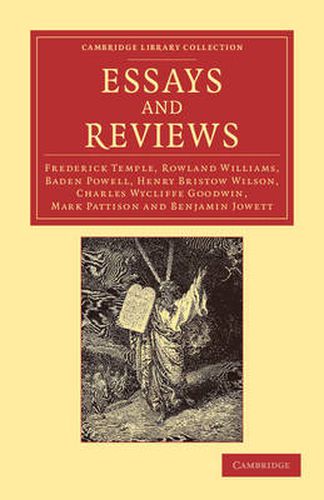Readings Newsletter
Become a Readings Member to make your shopping experience even easier.
Sign in or sign up for free!
You’re not far away from qualifying for FREE standard shipping within Australia
You’ve qualified for FREE standard shipping within Australia
The cart is loading…






Comprising seven essays by learned contributors and controversially advocating a rationalist Christianity, this work became a sensation upon publication in 1860. Frederick Temple (1821-1902), later Archbishop of Canterbury, wrote on the cultural contributions of non-Christians; Roland Williams (1817-70), Professor of Hebrew at Lampeter, questioned Old Testament prophesies; Baden Powell (1796-1850), Oxford Professor of Geometry, challenged belief in miracles and embraced Darwinism; Henry Bristow Wilson (1803-88) questioned literal biblical history; the only lay contributor, Egyptologist Charles Wycliffe Goodwin (1817-78), embraced geology; Mark Pattison (1813-84), tutor at Lincoln College, wrote on the history of rationalist theology; and Benjamin Jowett (1817-93), Oxford Professor of Greek, advocated a historical reading of the Bible. Wilson and Williams were later found guilty of heresy by a Church court, though this was overturned on appeal. For readers interested in the theological controversies of the Victorian era, these essays remain invaluable.
$9.00 standard shipping within Australia
FREE standard shipping within Australia for orders over $100.00
Express & International shipping calculated at checkout
Comprising seven essays by learned contributors and controversially advocating a rationalist Christianity, this work became a sensation upon publication in 1860. Frederick Temple (1821-1902), later Archbishop of Canterbury, wrote on the cultural contributions of non-Christians; Roland Williams (1817-70), Professor of Hebrew at Lampeter, questioned Old Testament prophesies; Baden Powell (1796-1850), Oxford Professor of Geometry, challenged belief in miracles and embraced Darwinism; Henry Bristow Wilson (1803-88) questioned literal biblical history; the only lay contributor, Egyptologist Charles Wycliffe Goodwin (1817-78), embraced geology; Mark Pattison (1813-84), tutor at Lincoln College, wrote on the history of rationalist theology; and Benjamin Jowett (1817-93), Oxford Professor of Greek, advocated a historical reading of the Bible. Wilson and Williams were later found guilty of heresy by a Church court, though this was overturned on appeal. For readers interested in the theological controversies of the Victorian era, these essays remain invaluable.